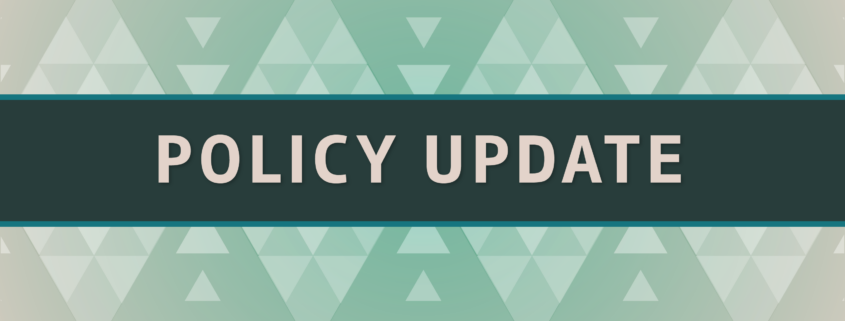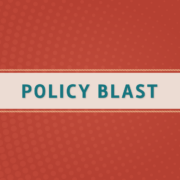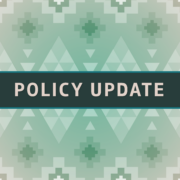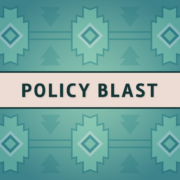Bipartisan Group of 61 Congressional Leaders Request Protection of IHS Funding and Increased Resources for Urban Indian Health
On May 15, 2025, 60 Congressional leaders joined Representative Leger Fernandez in her letter to Chairman Simpson and Ranking Member Pingree of the House Interior Appropriations Committee requesting a minimum of $100 million for Urban Indian Health, maintaining advance appropriations for the Indian Health Service (IHS), and protecting IHS from sequestration in the final fiscal year (FY) 2026 Interior, Environment, and Related Agencies Appropriations Act. The letter emphasizes that the federal government has a trust responsibility to provide federal health services to maintain and improve the health of American Indian and Alaska Native people.
The bipartisan group of 61 Congressional leaders reiterated their support for the House Appropriations Committee’s inclusion of advance appropriations for IHS for FY 2026 in the recent Continuing Resolution. Previously, IHS was the only federal health care provider funded through annual appropriations. Without advance appropriations, IHS is subject to the negative impacts of government shutdowns and continuing resolutions that can lead to serious disruptions in urban Indian organizations ability to provide critical patient services. The continued inclusion of advance appropriations is a crucial step toward ensuring long-term stable funding for IHS.
This letter sends a powerful message to Chairman Simpson and Ranking Member Pingree, and Members of Congress that in order to fulfill the federal government’s trust responsibility to all Native people to provide safe and quality healthcare, funding for IHS must be significantly increased.
NCUIH is grateful for the support of the following Representatives:
- Teresa Leger Fernandez (D-NM-3)
- Jeff Hurd (R-CO-3)
- Don Bacon (R-NE-2)
- Dusty Johnson (R-SD-At Large)
- Jared Huffman (D-CA-2)
- Raul Ruiz (D-CA-25)
- Kim Schrier (D-WA-8)
- Gwen Moore (D-WI-4)
- Seth Moulton (D-MA-6)
- Stephen Lynch (D-MA-8)
- Mark Takano (D-CA-39)
- Kristen McDonald Rivet (D-MI-8)
- Ilhan Omar (D-MN-5)
- Haley Stevens (D-MI-11)
- Jimmy Panetta (D-CA-19)
- Ro Khanna (D-CA-17)
- Shontel Brown (D-OH-11)
- Greg Stanton (D-AZ-4)
- Pramila Jayapal (D-WA-7)
- Julie Johnson (D-TX-32)
- Juila Brownley (D-CA-26)
- Steve Cohen (D-TN-9)
- Doris Matsui (D-CA-7)
- Timothy Kennedy (D-NY-26)
- Yassamin Ansari (D-AZ-3)
- Diana DeGette (D-CO-1)
- Melanie Stansbury (D-NM-1)
- Gabe Vasquez (D-NM-2)
- Salud Carabajal (D-CA-24)
- Sharice Davids (D-KS-3)
- Brittany Pettersen (D-CO-7)
- Chris Deluzio (D-PA-17)
- Jared Golden (D-ME-2)
- Raja Krishnamoorthi (D-IL-8)
- Chuy Garcia (D-IL-4)
- Nanette Diaz Barragan (D-CA-44)
- Jahana Hayes (D-CT-5)
- Gilbert Ray Cisneros, Jr. (D-CA-31)
- Juan Vargas (D-CA-52)
- Shomari Figures (D-AL-2)
- Adam Smith (D-WA-9)
- Sara Jacobs (D-CA-51)
- Jared Moskowitz (D-FL-23)
- William R. Keating (D-MA-9)
- Greg Casar (D-TX-35)
- Janelle S. Bynum (D-OR-5)
- Maxine Dexter (D-OR-5)
- Robin Kelly (D-IL-2)
- Val Hoyle (D-OR-4)
- Joe Neguse (D-CO-2)
- Jim Costa (D-CA-21)
- Zoe Lofgren (D-CA-18)
- Scott Peters (D-CA-50)
- Darren Soto (D-FL-9)
- Kevin Mullin (D-CA-15
- Luz Rivas (D-CA-29)
- Rick Larsen (D-WA-2)
- Sam Liccardo (D-CA-16)
- Hillary Scholten (D-MI-3)
- Steven Horsford (D-NV-4)
- Linda Sanchez (D-CA-38)
Full Letter Text
Dear Chairman Simpson and Ranking Member Pingree:
We write to thank you for your proven commitment to the Indian healthcare system, including Urban Indian Organizations (UIOs), and to request your continued support by funding Urban Indian Health at the highest possible level, with a minimum of $100 million, which is in line with the House proposed amount for FY 2025. Additionally, we would like to request that you retain advance appropriations for the Indian Health Service (IHS) in FY 2027 and protect IHS from sequestration in the final FY 2026 Interior, Environment, and Related Agencies Appropriations Act.
The federal government has a trust responsibility to provide federal health services to maintain and improve the health of American Indian and Alaska Native people. According to the Tribal Budget Formulation Workgroup (TBFWG), a workgroup comprised of Tribal leaders representing all twelve IHS service areas and serving all 574 federally recognized Tribes, “only a significant increase to the Urban Indian Health line item will allow UIOs to increase and expand services to address the needs of their Native patients, support the hiring and retention of culturally competent staff, and open new facilities to address the growing demand for UIO services.” American Indians and Alaska Natives experience major health disparities compared to the general U.S. population, including lower life expectancy, higher rates of infant and maternal mortality, and psychological or behavioral health issues. This is true regardless of where an American Indian or Alaska Native person lives. A lack of sufficient federal funding for the Indian Health Service budget plays a significant role in these continuing devastating health disparities, as the Indian health system simply does not have the necessary financial resources and support to address these inequities.
The lack of federal funding is deeply impactful for UIOs who are on the front lines in working to provide for the health and well-being of American Indian and Alaska Native people living outside of Tribal jurisdictions. UIOs are an integral part of the Indian health system, comprised of the Indian Health Service, Tribes, and UIOs (collectively I/T/U), and provide essential healthcare services, including primary care, behavioral health, and social and community services, to patients from over 500 Tribes in 38 urban areas across the United States. Unfortunately, despite being an integral part of the I/T/U system UIOs are chronically underfunded. The urban Indian health line item historically makes up only one percent (1 percent) of IHS’ annual appropriation and UIOs often only receive direct funding from the urban Indian health line item. UIOs generally do not receive direct funds from any other distinct IHS accounts, including the Hospital and Health Clinics, Indian Health Care Improvement Fund, Health Education, Indian Health Professions, or any of the line items under the IHS Facilities account.
Without a significant increase to the Urban Indian Health line item, UIOs will continue to be forced to operate on limited and inflexible budgets that limit their ability to fully address the needs of their patients. Current funding levels pose challenges for UIOs in offering competitive salaries to attract and retain qualified staff who are essential for delivering quality care to their communities. Additionally, UIOs need resources to expand their services and programs, including addressing pressing issues such as food insecurity, behavioral health challenges, and rising facilities costs. By providing UIOs with the necessary resources, we can ensure that American Indian and Alaska Native people receive the comprehensive and culturally competent healthcare services they deserve.
We appreciate the inclusion of advanced appropriations for IHS for FY 2026 in the recent Continuing Resolution. Because of this inclusion, the I/T/U system has been able to operate normally and without fear of funding lapses during the FY 2026 appropriations negotiation process. We emphasize that advanced appropriations are a crucial step towards ensuring long-term, stable funding for IHS and, therefore, it is imperative that you include advance appropriations for IHS FY 2027 in the final FY 2026 Interior, Environment, and Related Agencies Appropriations Act. Further, for the reasons discussed above, we request that you protect IHS from any sequestration measures taken in this Act, as IHS, and the urban Indian line item, cannot afford any funding reduction.
Thank you for your consideration of our request.








